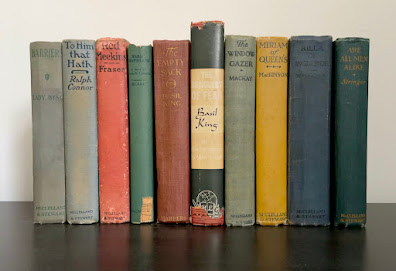Old Soldier
Frederick Niven
London: Collins, 1936
250 pages
Stewart Reid lives in a small flat with his wife and two young sons in Edinburgh's east end. Minnie sleeps in the one bedroom; the boys share a "concealed bed" in the parlour. Stewart's days begin in a cot next to the stove in the camped kitchen. The missus can't abide this thrashing about under the covers.
Read nothing into that.
Stewart loves Minnie. Minnie loves Stewart. Their lives are happy. Each Friday night, Minnie meets her man as he leaves work. He hands her his pay packet. She withdraws a shilling and he has a dram at the local. Minnie enjoys a bottle of lemonade.
"He's a man who needs a woman to look after him, or a sergeant," says Todd, the oldest of the old soldiers.
Old Soldier is a quiet novel. Nothing much happens. After several dozen pages, one looks about in search of a plot device. Might it be Mackenzie Brothers' flirtatious charwoman Nell Drummond, she of the swinging skirt? Could it have something to do with cold Rev Dr Churchkirk's refusal to be held accountable for the debts of his wife and daughter? How about paymaster Beck's suggestion that Stewart's holiday allotment be held back, lest the old soldier spend it on... you know, his holiday?
Wait, it's the holiday itself, right?
But no, Old Soldier is a tale of everyday life. Its hero is a man who ventures out on a Monday, does drudgery, and suffers an indignity or two for the love of his wife and boys. On Tuesday, he rises in his kitchen cot and prepares for the same. Stewart becomes complaisant. The reader becomes complaisant. When something of significance does happen – remarkably late in the novel – the reader may be caught off guard.
I know I was.
These things happen to other people. Not to me. Not to Stewart Reid.
And yet he continues on, an old soldier.
Dedication: To the author's wife, journalist Mary Pauline Thorne-Quelch.
Object: Purchased last year for £3.00 from a bookstore in Wallingford, England, my copy once belonged to the Newlands Circulating Library of Fiction, 16 Stafford St, Shandwick Place, Edinburgh. I'm sad to report that the address is now taken up by a Frontiers store.
I found this piece of ephemera glued to page 187:
The novel is followed six full-page adverts for other Niven titles: The Flying Years, Triumph, Mrs. Barry, The Rich Wife, The Paisley Shawl, and The Three Marys.
Access: As far as I've been able to determine, the novel enjoyed just one edition and one printing. A bookseller in Tamworth, England offers an ex-library copy at £8.00.
That's it.
It can be read online here courtesy of the Faded Page.



































